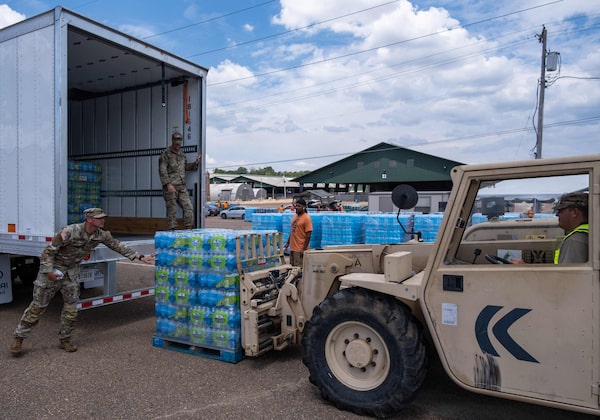
Mississippi National Guardsmen direct traffic as they pass out cases of drinking water to Jackson, Miss., residents on Sept. 2, at Smith Wills Stadium.Rogelio V. Solis/The Associated Press
When Sharon Brown has been able to get water out of her taps this week, it’s been too turbid even to bathe in. So the 50-year-old social worker in Jackson, Miss., has been driving a half-hour out of town to her grandmother’s house to fill up jugs of water to wash herself. For drinking, cooking, doing dishes and brushing her teeth, she relies on cases of bottled water.
What frustrates Ms. Brown the most is that this is the fifth failure of her city’s water system in recent years.
“It’s like a third-world country, except that we have the ability and capability to provide the bare minimum. And yet here we are again,” she said.
Mississippi’s capital has been on a boil water advisory since late July because of problems with the pumps at its aging water treatment plant. Then, this week, heavy rains caused the Pearl River to rise sharply and overwhelm the plant, leaving the entire city with little or nothing coming from faucets.
Flooding a threat in northern parts of Mississippi, Alabama
The sheer magnitude of the outage – which has left 160,000 people without water – prompted an intervention from President Joe Biden. In a disaster declaration, he authorized federal funding and expertise to get the plant back online and pay for emergency water supplies.
“We’ve offered every single thing available. In Mississippi, the Governor has to act. There’s money to deal with this problem,” Mr. Biden said this week.
Gov. Tate Reeves deployed National Guard personnel Thursday to distribute bottled water. Jackson Mayor Chokwe Antar Lumumba said crews were making progress getting the plant’s pumps working again.

Mississippi National Guard troops unload pallets of water at the State Fair Grounds in Jackson.SETH HERALD/AFP/Getty Images
How or when a permanent solution would be implemented, however, remained unclear. And the crisis is raising tough questions about the unequal burdens of climate change. Jackson, a majority-Black city with a poverty rate almost double the national average, has for years warned that it doesn’t have the money it needs to keep its infrastructure working. The state government has deflected blame by saying it’s up to municipalities to run their water distribution systems.
“This is an environmental justice issue,” said Danyelle Holmes, 48, an organizer with the Poor People’s Campaign, as she handed out cases of bottled water in a mall parking lot. “This is a clear neglect of the poor and an attack on Black leadership.”
Ms. Holmes has had brown water coming from her taps for the past four years. Her group, along with several others, had already been planning the daily bottled water distribution before this week’s flooding made the long-simmering problem suddenly acute.
Across the city, virtually every business and institution has had to adapt, often at great expense.
Jackson State University has rented port-a-potties for students in dorms, and its football team relocated to a hotel so players could shower. One hospital brought in tanker trucks, while another saw its air conditioning break down because there wasn’t enough water pressure to fill the chillers. Some restaurants and bars closed their doors.
At the Iron Horse Grill, general manager Andy Nesenson said the downtown restaurant has been spending US$2,000 to US$2,500 a week since late July to bring in bottled water and canned drinks. It goes through more than 300 kilograms of ice daily. In addition, business has dropped 30 per cent compared with this time last year.

Annie S. Mitchell, vice president for Marketing and Communications at Millsaps College in midtown Jackson, Miss., shows off the interior of one of the sets of portable showers the school rented for the 200 students that remained on campus during the city's latest water crisis.Rogelio V. Solis/The Associated Press
“We’re absolutely losing money,” he said. “I just had four private events cancel.”
Still, he counts himself relatively lucky that he has enough nonpotable water to stay open. During a previous water outage, after an ice storm early last year, the restaurant posted a US$10,000 loss because it had to shut down for a week.
Unloading a pallet of bottled water at a distribution site outside an elementary school, Quad Johnson said he’s weathering the outage by relying on friends and family. He calls around every day to see if anyone he knows has running water at their house.
“Yesterday, I had to go to work and I couldn’t take a bath,” Mr. Johnson, 24, said. “You need water to do everything.”
Derrick Hunter, a 22-year-old factory worker, said he had to fill up buckets of water at the lumber yard where his father works and take them home to flush the toilet.
“It’s ridiculous because we spend our hard-earned money on our taxes and we don’t know where our money’s going,” he said.
Breyanna Lyles, who lives in a Jackson suburb that still has running water, said her family has been inviting relatives from the city to shower all week. During previous outages, she lived in Jackson and remembers heating up pots of water on the stove to fill the bathtub.
“It happens every year. I think most people are pretty much used to it,” Ms. Lyles, 17, said. “It’s been going on too long for it to keep happening.”
Our Morning Update and Evening Update newsletters are written by Globe editors, giving you a concise summary of the day’s most important headlines. Sign up today.
 Adrian Morrow
Adrian Morrow